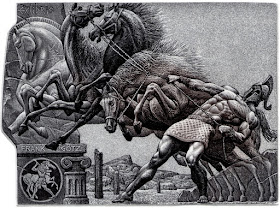Diodorus Siculus writes about Diomedes and his horses in his 'Library of History':
"The next Labour which Heracles undertook was the bringing back of the horses of Diomedes, the Thracian. The feeding-troughs of those horses were of brass because the steeds were so savage, and they were fastened by iron chains because of their strength, and the food they ate was not the natural produce of the soil but they tore apart the limbs of strangers and so got their food from the ill lot of hapless men. Heracles, in order to control them, threw to them their master Diomedes, and when he had satisfied the hunger of the animals by means of the flesh of the man who had taught them to violate human law in this fashion, he had them under his control." [4.15.3]
Apollodorus, in his 'Histories', gives more details about Diomedes' divine heritance, as was ascribed to him.
"Now this Diomedes was a son of Ares and Cyrene, and he was king of the Bistones, a very warlike Thracian people, and he owned man-eating mares." [2.5.8]
There is a beautiful description of the horses in question, too, attributed to Philostratus the Elder, in his 'Imagines'. He tells us a different tale than the one to follow--one that discredits the fact that Hēraklēs had the taking of the horses as his eight labour--but that makes no difference on his vision of the horses:
"Let us not consider the mares of Diomedes to have been a task for Heracles, my boy, since he has already overcome them and crushed them with his club – one of them lies on the ground, another is gasping for breath, a third, you will say, is leaping up, another is falling down; their manes are unkempt, they are shaggy down to their hoofs, and in every way they resemble wild beasts; their stalls are tainted with flesh and bones of the men whom Diomedes used as food for his horses, and the breeder of the mares himself is even more savage of aspect than the mares near whom he has fallen." [2.25]
The task was to bring back the horses to Eurystheus, and that is exactly what Hēraklēs did. In the words of Apolodorus:
"So Hercules sailed with a band of volunteers, and having overpowered the grooms who were in charge of the mangers, he drove the mares to the sea." [2.5.8]
There isn't a heroic description available of the actual theft, but there is Philostratus' accounts, which is the only one who mentions Abderos, a son of Hermes of Opus, who was Hēraklēs friend, squire, and--according to Philostratus--his lover. Once Hēraklēs came to the sea, he was overtaken by the Bistones, and during the ensuing fight he entrusted the mares to Abderos for safekeeping as he fought. during the fight, the horses tore up Abderos and partly ate him. In reaction Hēraklēs killed Diomedes and fed his body to the mares, who instantly became tame. He built the town of Abdera, in honour of his unfortunate friend, and then returned to Mycenae to finish the labour.
"Eros enjoins it upon Heracles in addition to many others, and since the hardship laid upon him was no slight matter. For Heracles is bearing the half-eaten body of Abderus, which he has snatched from the mares; and they devoured him white yet a tender youth and younger than Iphitus, to judge from the portions that are left; for, still beautiful, they are lying on the lion’s skin. The tears he shed over them, the embraces he may have given them, the laments he uttered, the burden of grief on his countenance – let such marks of sorrow be assigned to another lover; for another likewise let the monument placed upon the fair beloved’s tomb carry the same tribute of honour; but, not content with the honours paid by most lovers, Heracles erects for Abderus a city, which we call by his name, and games also will be instituted for him, and in his honour contests will be celebrated, boxing and the pancratium and wrestling and all the other contests except horse-racing."[2.25]
Diodorus ends the tale:
"And when the horses were brought to Eurystheus he consecrated them to Hera, and in fact their breed continued down to the reign of Alexander of Macedon." [4.15.4]

No comments:
Post a Comment